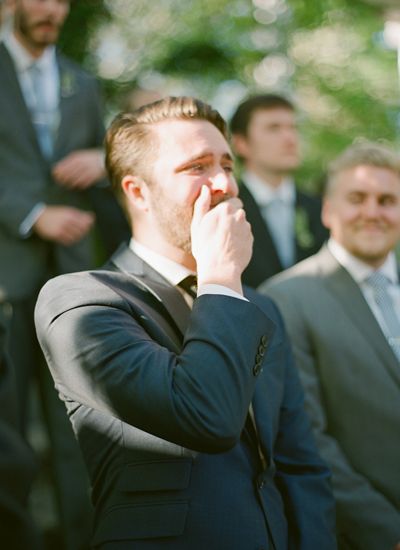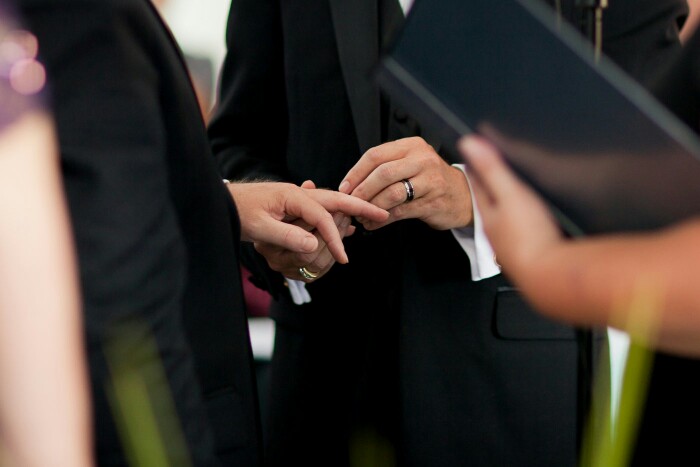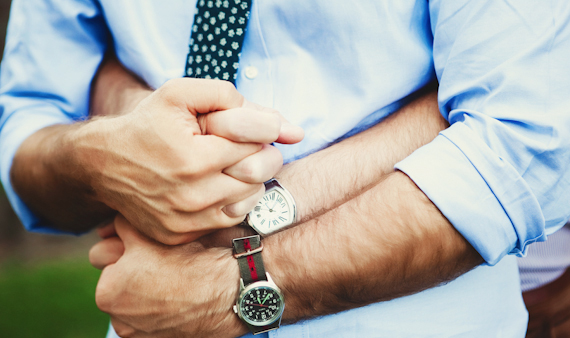Pointers from An Unconventional Officiant
Auberge du Soleil
Second to “I do” no other phrase in a wedding ceremony makes one’s nuptials more legit than the one that starts “by the power vested in me…”
And, that “me” will be a man or woman of great importance to your ceremony and life together. Whom you choose to declare you husband and husband can be the most or least traditional part of your big day.
Selecting a rabbi, pastor, priest or other religious figure conveys a couple’s beliefs and a desire to live married life according to a particular religious tradition. However, selecting a friend or loved one to officiate your ceremony will lead you into married life in a manner 100% defined by you.
Brian Buenneke, a great friend of ours at Men’s Vows, served as officiant for not one, but two, weddings of very close friends of his. We spoke to Brian about his experience becoming a “man of the cloth” and asked him to share some tips to help you help your non-traditional officiant make yours a memorable and meaningful ceremony.
MV: BB, tell us, what it was like to be asked to play such an important role in your friends’ ceremony?
BB: To be asked to officiate is one of the most flattering things a friend can ask. And, it is down to the simple fact that a couple’s wedding day is one of the most important days in their lives.
On that day, you play a dual role directing the ceremony and conveying the character of the grooms and the nature of their relationship. But, you want to be careful not to be the person who shows up in a slutty dress! While the officiant plays an important and memorable role, the day is ultimately about the grooms and it is up to the officiant to make sure things run smoothly and that the attention is squarely on the guys getting married.
"You want to be careful not to be the person who shows up in a slutty dress!"
MV: We are sure flattery quickly turns to panic! How did you go about readying yourself for the ceremony? How did you prepare your words?
BB: After the flattery waned, I got practical. I quickly sat down with the grooms to get a sense of what they each envisioned for their ceremony. Again, it was all about them, so while I would share an opinion at the margins, I was there to be present for a conversation between the grooms as they aligned their vision for the ceremony.
As we got closer to the date, we kept talking to make sure all of the logistics were understood. We reviewed the program for the whole ceremony a lot and, for the grooms that wanted to know what I was going to say, we reviewed my words. That said, one of the couples wanted my part of the ceremony to be a surprise in the moment, even if we did discuss a lot of what was to be included.
On the day, everything can make you nervous, given the responsibility of the role, being in front of your peers, in front of their GRANDPARENTS! The grooms are emotional, everyone is emotional so you have to keep on an even plane.
So, really, you’ve got to give it your all in keeping your sh*t together!
MV: How would you describe your ceremony? What made it particular to you and, more importantly, particular to the grooms?
I talked a lot with the grooms about what they wanted from me. We all had multiple sit-downs. Again, while I would give modest advice, the real purpose was to help them focus on their ideas for the ceremony, my role in it and how they wanted me to “celebrate” their partnership for their guests.
One of the couples wanted me to share personal stories. I was more of a commentator in their ceremony.
For the other couple, I read their vows for them to acknowledge and repeat. For that ceremony, I was more of a director.
But, in both cases, I made sure that the attention was placed back on them even when the spotlight was on me, and this includes after the ceremony when people were nice enough to praise the ceremony! Keep putting it back on the grooms!
I am glad their weddings were so different given they were two months apart and included shared guests. No way I was going to get to away with just “rolling tape!”
MV: Looking back, how might you have approached the planning or the ceremony differently?
I don’t think I would have done much differently, But, I will say that one of the aspects I found most helpful was to really scout the venue beforehand. It is important to get familiar with the space to understand how much to project, where to face, etc. Being indoors is a very different experience to holding a space outdoors.
Also, though I rehearsed a lot, I would recommend you have cue cards to hand! You never know if the emotion of the moment will take you over, too!
MV: What advice would you give grooms so they can be of most help to their officiant? What advice would you give other officiants?
For the grooms, I say provide as much information about the wedding, the vibe you want, the words you want shared. Be totally open and honest because saying: “you’ll be great” doesn’t cut it! Every groom has more than an idea of what they want from their officiant.
And, the thing that is really important to keep in mind is that people picked you for a reason. Find out what it is and draw inspiration from it. They want something personal about them together and your relationship to them. For both my couples, I was a close mutual friend. If that isn’t the case, make sure you find a balance and represent both grooms meaningfully.
Click below to read our articles for the April "Ritual or Rebellion" edition of Men's Vows
The Ring Conundrum: When Two Type A's Wed
Pointers from an Unconventional Officiant
Breathtaking Honeymoon Destinations
Style Guide: Ritual or Rebellion








